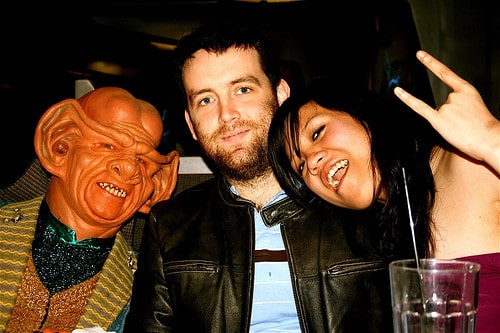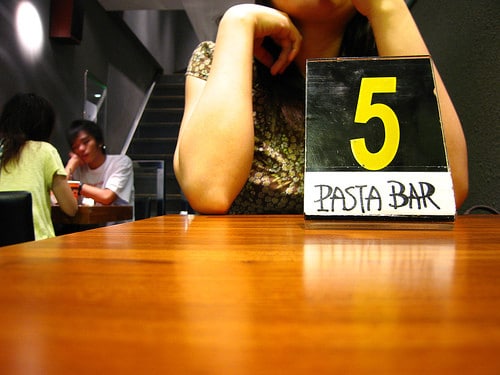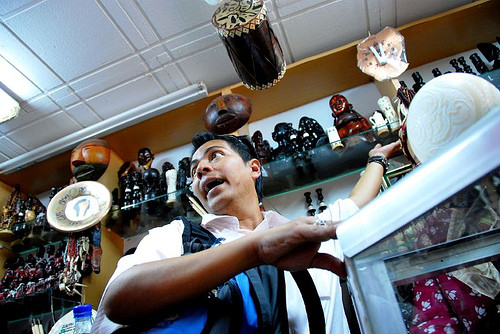The Ferengi are the Star Trek universe’s greedy, mischievous, and crafty aliens whose entire culture is based on accumulating wealth. They are so dedicated to money that their holy book, “The Rules Of Acquisition” are a set of guidelines by which to conduct business. While the Ferengi world may be fictional, their rules can help you bargain your way in and out of most markets anywhere on Earth.

Rule # 214 – “Never Begin A Negotiation On An Empty Stomach”
Bargaining takes time and if you’re in a rush you won’t get the price you want and likely get frustrated in the process. Don’t start bargaining when you’re hungry, hurrying to make that tour bus, or when you’re bladder is telling you otherwise. Limited time means you’ve got less wiggle room to get that price down to what’s fair.

Rule # 7 – “Keep Your Ears Open”
You’ll stand a better chance of bargaining your way to a good price if you listen carefully to the person you’re negotiating with. You’ll notice when bargaining for anything, the seller is usually adept at picking up clues about their potential customers (Rule # 194 by the way – it’s always good to know about new customers before they walk in the door). Do the same, ask questions and have a conversation – and make sure to keep in mind all of the prices you’re quoted too.

Rule #3 – Never Spend More On An Acquisition That You Have To
People who aren’t comfortable bargaining often feel “bad” about asking for a lower price. During any negotiation in a shop, the prices are already inflated and the shopkeeper has a number in mind (Rule # 98 – “every man has his price”); a hard and soft point. The soft point is where you’ll get with a bit of negotiating, often the big initial drop in price. The hard point takes longer (recall Rule # 214 above) and is the lowest price the owner is really willing to accept.

Rule #74 – Knowledge Equals Profit
In addition to keeping your ears open (Rule # 7) you should keep your eyes open too. Shop around to get a feel for the local prices of an item or similar things you may want to buy (like shoes for example). Get a good number in your head and research how bargaining works in a particular area so you know both how to negotiate on local terms and what prices to begin with. For example, in Morocco your initial price should generally start with 1/4 of the quoted price.

Rule #16 – A Deal Is A Deal
An unofficial Ferengi rule is to “always inspect the merchandise before making a deal.” Then, once you agree to a price, that’s the end of negotiations, a rule that hopefully the person you’re dealing with will follow as well. After both sides agree (and don’t agree if you feel ripped off!) and are happy with the final price, relax. Assuming nothing extremely out of the ordinary happens, a deal is a deal. Bargaining isn’t a competition and more important than the best price is that you leave feeling good about the transaction.

Be Savvy And Enjoy The Process
Negotiating is a process you can learn to love. Bargaining is like a game and an integral part of many cultures here on Earth. The process is about forging relationships – locally it’s how shopkeepers can earn repeat business – and for you it can be a good way to learn about an individual in the society you’re visiting. You’ll most always be asked an initial price or what you think is fair for something, so have a number in mind. The lower the better (it can’t hurt if in doubt) and be sure to engage the person.
It’s what the Ferengi would do – well, they’d also do a lot of unethical and illegal things – but if you stick to these select Rules Or Acquisition you should be able to bargain like an intergalactic pro even if you don’t know the local language.
[photos by: karenchu121 (drinks with Ferengi), Socwind (empty table), dotbenjamin (string telephone), benjuni (bargaining), Gerwin Filius (dollar bill), Litandmore (handshake)]












Bargaining is one of the skills I’m sorely lacking in, but really need to improve as my travel increases.
Thanks for this! You know just how to reach my geeky inner core! Well, my outer shell is pretty geeky, too, but I’m just sayin’
I love bargaining most of the time. I see it as a strategy game but a big hassle when you’re in a rush. Gotta hand it to the Ferengi though, they know how to wheel and deal almost anything. Guess we huu-mans have a lot to learn!
What a delightful way to approach this subject!! As far as bargaining, I am married to the world’s BEST bargainer…so I think I might be investigating to see if he is somehow related to the Ferengi- or maybe he is one in disguise!
Sent here to learn about human ways! Being a good bargainer is such a useful travel talent to have – must be saving lots when you travel!
I’m the world’s worst bargainer – at the end of the day, I’d rather spend my time on other things than shaving a bit more off the price, and I always have this mindset that they need the money more than me
Understandable, it’s time consuming definitely. What you lose in money you gain in time 🙂
Now that I’m back in the states, I have a bad habit of thinking about bargaining but I know I can’t. Ugh
It would be nice to be able to bargain a bit more in the US, make the shopping process more interesting and personal 🙂
I must admit that I am not the best bargainer. Somehow, I always leave thinking I’ve paid too much or been taken advantage of. Example: In India, at the Ajanta caves, I bought several little jewel boxes carved from stone. The touts harassed me the rest of the day, to the point where I had to go barricade myself in the car while I waited for the rest of my group to return. When they did, one of the other women told me she had been accosted by a tout and said she had no money. He replied: “That’s OK, Barbara does!”
Those experiences really take the joy out of bargaining. Once it becomes a competition or a way to get the most money out of people it loses its meaning and isn’t really fun.
I’ve found that the more a traveler can learn about the subtle expressions and body language of a particular culture, the easier it is to bargain. There is a difference between the traveler who bargains as a foreigner and the traveler who bargains as a local would. A couple of examples would be using the all-purpose head wiggle in India or always maintaining a friendly appearance, even when frustrated, while bargaining in Thailand.
Acting like a local often helps get you local prices, or at least a bit closer to local prices.
Good advice Earl, I agree with you. Much of culture is subtle and the more you can pick up the better in negotiating and otherwise 🙂
I’m no good at bargaining. I delegate it to Mr G when we’re travelling, who’s had far more practice.
And I LOVE the title of this post! 😀
Thanks! Anytime I can cross Trek and traveling I do and will 😛
While I think it’s important to bargain for purchases in cultures that expect it, nothing makes me sadder than to see a well-financed tourist return to a luxury cruise ship bragging about how they bargained down the price of an object from $5 to $1. When traveling, I bargain hard if I’m buying an expensive item. But if it’s a souvenir off the street,I allow the vendor to make a $1 or $2 more than they should. It’s not going to hurt my wallet but will hopefully help someone who obviously needs the money.
I think the final price isn’t as important as the process one takes to get there. The value is the conversation in between the initial offer and the final purchase.